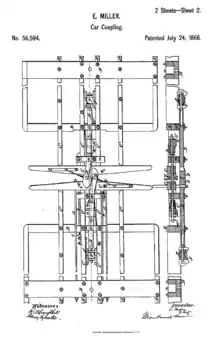
Miller's design for railroad cars and couplers
The Miller platform was an innovative railroad passenger car platform of the 19th century designed to prevent the hazard of telescoping in railroad collisions. It was named for its U.S. inventor, Ezra L. Miller, who was issued a patent for it on July 24, 1866.[1][2] The platform was part of an assembly which included a new type of coupler called the Miller hook which came to replace the older link-and-pin coupler.
References
- ↑ Patent No. US56594
- ↑ The National Cyclopaedia of American Biography. Vol. VII. James T. White & Company. 1897. pp. 116–117. Retrieved February 20, 2021 – via Google Books.
External links
- CPRR Discussion Group: Miller Platform and couplers
- Ezra Miller and His Hook, scroll down
- Telescoping and the Miller Platform
This article is issued from Wikipedia. The text is licensed under Creative Commons - Attribution - Sharealike. Additional terms may apply for the media files.